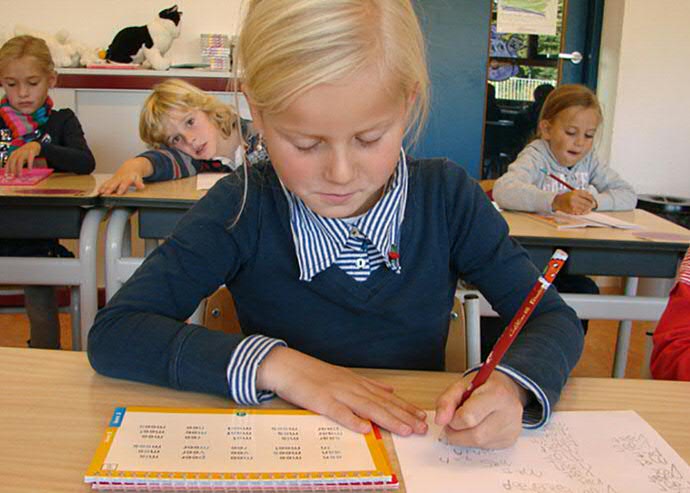Sterke aanwijzingen gevonden die mythes over links- en rechtshandigheid naar de prullenbak verwijzen

Nieuw onderzoek van de Rijksuniversiteit Groningen in samenwerking met het Weekend van de Wetenschap wijst uit dat niet links- of rechtshandigheid, maar de sterkte van handvoorkeur een relatie vertoont met bepaalde eigenschappen zoals creativiteit en gezondheid.
In alle menselijke populaties is er altijd een minderheid die linkshandig is. Er wordt vaak aangenomen dat dit verschil in handvoorkeur ook andere eigenschappen weerspiegelt maar welke zijn dat dan? De Rijksuniversiteit Groningen heeft in samenwerking met het Weekend van de Wetenschap mythes en aannames over links- en rechtshandigen onderzocht. Linkshandigen zouden meer gezondheidsproblemen hebben (waardoor zij in de loop van de evolutie de minderheid zijn geworden), maar creatiever en beter in gevechten zijn (waardoor linkshandigheid in de loop van de evolutie toch is blijven bestaan). De verrassende uitkomst: deze mythes worden niet bevestigd. Het onderzoek levert daarbij een aantal nieuwe inzichten op. De resultaten van het onderzoek zijn na te lezen op www.helpeenhandje.nl.
Landelijk publieksonderzoek
Het Weekend van de Wetenschap startte in 2014 met een jaarlijks landelijk publieksonderzoek. Heel Nederland krijgt hiermee de kans om door deelname aan de activiteiten in het weekend van 3 en 4 oktober, en via een langer lopende internetstudie te verdiepen in de wereld van wetenschap en technologie. De internetstudie naar de mythes rondom links- en rechtshandigheid van de RUG trok 30.000 deelnemers van 5 tot 95 jaar. Opvallend is dat iets meer dan de helft van de deelnemers linkshandig is, terwijl van de hele Nederlandse populaties er slechts 10% linkshandig is. Dit geeft aan dat het onderwerp sterk leeft bij linkshandigen die blijkbaar vinden dat ze buitenbeentjes zijn of als zodanig gezien worden. Er werd onder meer gevraagd naar zowel feitelijke gegevens als naar de eigen inschatting van creativiteit, gezondheid en verbaal en fysiek geweld.
Links- en rechtshandigen verschillen niet of nauwelijks in al deze eigenschappen: de verschillen tussen mannen en vrouwen zijn vaak groter. Voor gezondheid is het zelfs zo dat in tegenstelling tot de mythe, rechtshandigen vaker ziek zijn dan linkshandigen. Hiermee zijn voor het eerst op basis van deze grote steekproef sterke aanwijzingen verzameld dat de mythes over links- en rechtshandigheid voor wat betreft creativiteit, gezondheid en opvliegendheid/agressie naar de prullenbak verwezen kunnen worden.
Handvoorkeur
Een nieuwe bevinding is dat niet links- of rechtshandigheid, maar hoe sterk de handvoorkeur is, een relatie vertoont met de onderzochte eigenschappen. Mensen met een zwakke handvoorkeur (die sommige taken liever met links doen en andere met rechts of weinig voorkeur hebben) zijn wat creatiever, agressiever en hebben vaker allergieën. Daarnaast zijn zij wat vaker dyslectisch en hebben gemiddeld wat minder (klein-)kinderen dan mensen die overwegend dingen met één voorkeurshand doen.
Dus alhoewel mensen links- of rechtshandigheid als een belangrijk persoonlijkheidskenmerk zien is misschien de sterkte van de handvoorkeur biologisch belangrijker. Dat neemt niet weg dat veel linkshandigen rapporteren dat zij in het dagelijks leven tegen specifieke problemen oplopen aangezien onze maatschappij veelal is ingericht voor rechtshandigen (variërend van de draaiing van keukenkastdeurtjes tot de opleiding van chirurgen), terwijl soms linkshandigheid juist een voordeel kan hebben (zoals in sommige sporten of beroepen).
Een belangrijk aspect van handvoorkeur is dat we met die hand de meeste oefening krijgen in allerlei fijne bewegingen die onder andere nodig zijn voor het gebruik van gespecialiseerde werktuigen. Het verschil tussen de handen in handvaardigheid is in het onderzoek ook getest. Dit is mogelijk belangrijker dan handvoorkeur zelf, en wordt nog geanalyseerd. De interessante vraag hoe links-rechtsverschillen tussen de hersenhelften samenhangen met links-rechtsverschillen op gedragsniveau wordt momenteel ook nader onderzocht.
Het Weekend van de Wetenschap
Het Weekend van de Wetenschap is het podium van de toekomst. Op 3 en 4 oktober gaat Nederland backstage bij bedrijven, instituten, universiteiten, (onderzoeks-)instellingen en musea om live wetenschap en technologie te beleven. Het doel: Nederland te laten ervaren hoe belangrijk, interessant en innovatief deze vakgebieden zijn en wat de onmisbare bijdrage is aan onze toekomst.
Eén weekend, 48 uur volledig in het teken van wetenschap en technologie.
In 2014 bezochten ruim 130.000 bezoekers één van de 191 deelnemende locaties van het Weekend van de Wetenschap. Voor jong en oud werden door heel het land meer dan 1.200 activiteiten georganiseerd. Dit jaar vindt het Weekend van de Wetenschap plaats op zaterdag 3 en zondag 4 oktober. Dit jaar hebben al 215 deelnemende organisaties zich aangemeld. Kijk voor meer informatie op www.hetweekendvandewetenschap.nl.
Bij de start werd over dit onderzoek een Unifocusvideo gemaakt: Ontrafelen mythes links- en rechtshandigheid
Meer nieuws
-
17 februari 2026
Van ghostbuster tot rampenonderzoeker
-
17 februari 2026
De lange zoektocht naar nieuwe fysica
